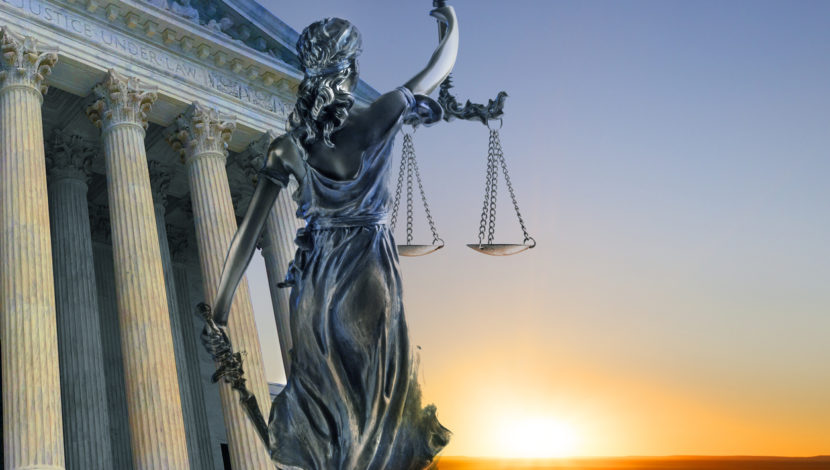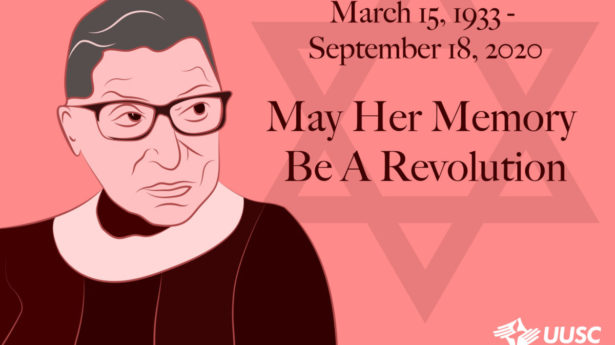The Unitarian Universalist Service Committee advances human rights through grassroots collaborations.
What’s at Stake in the Coming Supreme Court Battle

By on September 24, 2020
The tragic passing of Justice Ruth Bader Ginsburg came as a shock to admirers of the legendary jurist across the nation; to make matters worse, we were granted little time to mourn. Within 24 hours of her passing, Senate leadership was already threatening to rush a vote on Justice Ginsburg’s successor before the end of the presidential term—a move widely condemned as callous and hypocritical. The late Justice’s dying wish was that she would not be replaced on the bench until a different president assumed office.
Senate Majority Leader Mitch McConnell’s pledge to hold a vote on Trump’s nominee is also blatantly at odds with the reasoning he used to prevent a confirmation vote for the Obama administration’s last Supreme Court nominee, Merrick Garland. When Justice Antonin Scalia passed in February 2016, the Senator argued that nine months before an election was too close to allow a vote on his successor. Now, Senate leadership pledges a vote roughly six weeks before the country decides on the next president.
Regardless of who ultimately replaces Justice Ginsburg on the nation’s highest court, however, her successor’s decisions will affect human rights issues ranging from the ability to seek asylum to reproductive rights. For decades, Justice Ginsburg served as a bulwark for the defense of voting rights, civil rights, and gender equality in the United States. As the Senate weighs the nominee to succeed her, they must choose whether they will honor her legacy—or subvert the things she stood for.
Voting Rights
Justice Ginsburg’s passing comes at a time when the right to vote—one of the most fundamental in any democracy—is under renewed threat. The 2020 presidential election will be the second held nationally since a disastrous 2013 Supreme Court ruling, Shelby v. Holder, which stripped key portions of the 1965 Voting Rights Act, allowing states to pass new laws making it more onerous to cast a ballot. At the time, Justice Ginsburg wrote a prescient dissent, in which she said the Court had failed to recognize that, “the scourge of discrimination” was still alive and potent in this country.
In the years following this ruling, Justice Ginsburg’s warning was fulfilled with interest. State after state imposed new restrictions tactically designed to suppress the votes of Black, Latinx, and Native communities, tampering with polling locations and mandating new ID requirements that are more difficult for working class voters to meet.
Of the many concerns arising from Ginsburg’s death, one of the most grave is that we will no longer have her strong advocacy for the right to vote from the bench, which she also illustrated in cases concerning partisan gerrymandering and other practices that impede the full exercise of democratic rights.
Immigrant Rights
It was not only those with the ability to vote whom Justice Ginsburg defended from the bench, however; she also showed time and again her commitment to the human and Constitutional rights of non-citizens. In 2008, she cast a deciding vote in a 5-4 decision that recognized offshore prisoners held at Guantanamo Bay have habeas corpus rights; in other words, they are entitled like all other federal prisoners to access U.S. courts and contest their confinement. The following year, she did likewise in the landmark case Zadvydas v. Davis, establishing that noncitizens cannot be detained indefinitely.
In more recent years, Justice Ginsburg again served as a much-needed voice of conscience on the high court, as the Trump administration rolled back immigrants’ rights in unprecedented ways. While the Court’s conservative majority largely failed to provide a check on Trump’s violation of the rights of Muslim travellers, asylum-seekers, and others—allowing the president’s ban on refugees and nationals from several Muslim-majority countries to go into effect, for instance—Ginsburg recorded her opposition to these unlawful and cruel policies.
Ginsburg was, for instance, the only other member of the Court to join Justice Sotomayor’s strongly-worded dissent in Trump v. Hawaii, in which she called out the president’s “Muslim Ban” for violating bedrock U.S. principles of religious freedom and equal treatment before the law. She also authored the dissent from the Court’s disturbing opinion in Hernandez v. Mesa, in which the conservative majority found that the family of a Mexican child shot to death by a DHS agent (while the child was playing on the opposite side of the border) had no recourse from the courts.
Police Accountability
Hernandez v. Mesa underlines the difficulties people face seeking justice for civil rights violations committed by armed law enforcement—whether at the border or at the hands of local police. One major barrier to accountability has been the Supreme Court’s doctrine of “qualified immunity,” which set up a near-impossible test for winning civil rights cases against police and other officials, even in cases of egregious misconduct. As the victims of killings and other crimes perpetrated by law enforcement press on for justice, the issues of qualified immunity and police accountability are likely to continue to come before the Court.
Here as elsewhere, Ginsburg’s presence on the Court will be sorely missed. While Ginsburg did not weigh in against “qualified immunity” at every opportunity (in contrast to Justice Sotomayor’s more sustained concern with the issue), she made clear her skepticism of a legal doctrine that allows police officers to violate civil rights with near-impunity. In the 2018 case Kisela v. Hughes, Justice Ginsburg joined Justice Sotomayor’s dissent from the majority opinion, in which Sotomayor argued that the Court had failed to vindicate the Fourth Amendment rights of a woman shot by police. In doing so, she wrote, the Court “misapplie[d] the law, effectively treating qualified immunity as an absolute shield.”
Reproductive Rights and LGBTQ Equality
Also to be celebrated by posterity is Justice Ginsburg’s longstanding defense of reproductive justice and the rights of women and LGBTQ individuals from the bench—including joining rulings to uphold marriage equality and to prevent states from using underhanded tactics to deny a woman’s right to an abortion. In just the past few years she continued this role, even as the Trump administration posed new threats to women’s reproductive freedom and the equality of Transgender individuals.
While right-wing politicians have increasingly stigmatized and scapegoated Trans people, seeking to turn gender identity into a culture war issue they can exploit for demagogic effect, Justice Ginsburg provided a critical line of defense for Trans rights in multiple cases. She was one of six justices to side with plaintiffs in the landmark Bostock v. Clayton County, protecting Transgender, Lesbian, and Gay employees nationwide from workplace discrimination. Similarly, when the government requested a stay on a lower court decision blocking Trump’s ban on Trans military service members, Ginsburg was one of four justices to vote against allowing the president’s discriminatory policy to go into effect.
Climate Justice
Justice Ginsburg’s replacement will not only affect her legacy with regard to human rights in the United States, but the future of a livable climate globally. In 2007, Ginsburg was one of the five justices who eked out a majority in the case Massachusetts v. EPA, which established for the first time that greenhouse gas emissions count as a form of air pollution under the Clean Air Act. As courts take up challenges to the Trump administration’s effort to roll back restrictions on carbon emissions, whoever succeeds Ginsburg is expected to play a major role in deciding whether to respect or attenuate this important precedent.
These examples highlight only some of the countless ways in which Justice Ginsburg served as an ally to human rights. While her record on issues including asylum and the rights of prisoners was far from perfect—with some of her actions on the bench meriting serious criticism—the balance of her 27 years of service on the high court is plainly on the side of justice. If her successor fails to take up this mantle of leadership, untold millions will be left without recourse to justice from our nation’s final arbiters of the law. This is no light responsibility; as the cases cited in this article prove, Supreme Court decisions are in many instances a matter of life and death.
The Senate must take these obligations seriously and only confirm a successor to Justice Ginsburg who upholds her values and will honor her legacy. Our nation’s highest court must remain a place where wrongs are righted and justice can prevail. The fate of everyone who relies on the nation’s law to uphold human rights depends on it.
***
About UUSC: Guided by the belief that all people have inherent worth and dignity, UUSC advances human rights globally by partnering with affected communities who are confronting injustice, mobilizing to challenge oppressive systems, and inspiring and sustaining spiritually grounded activism for justice. We invite you to join us in this journey toward realizing a better future!
Photo Credit: iStock – DNY59

